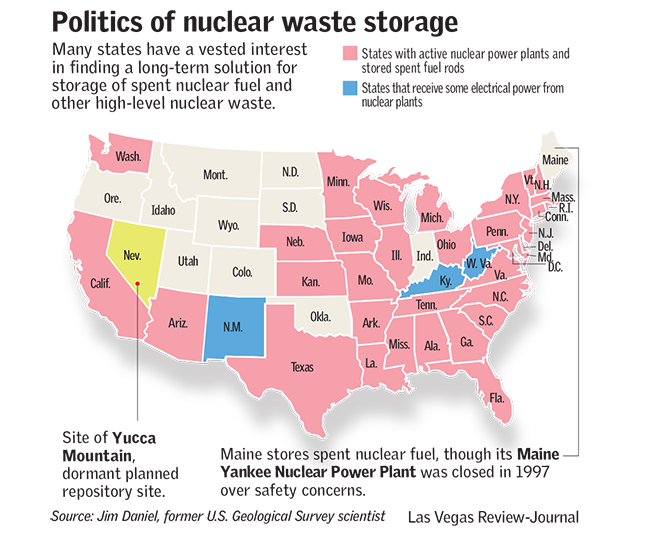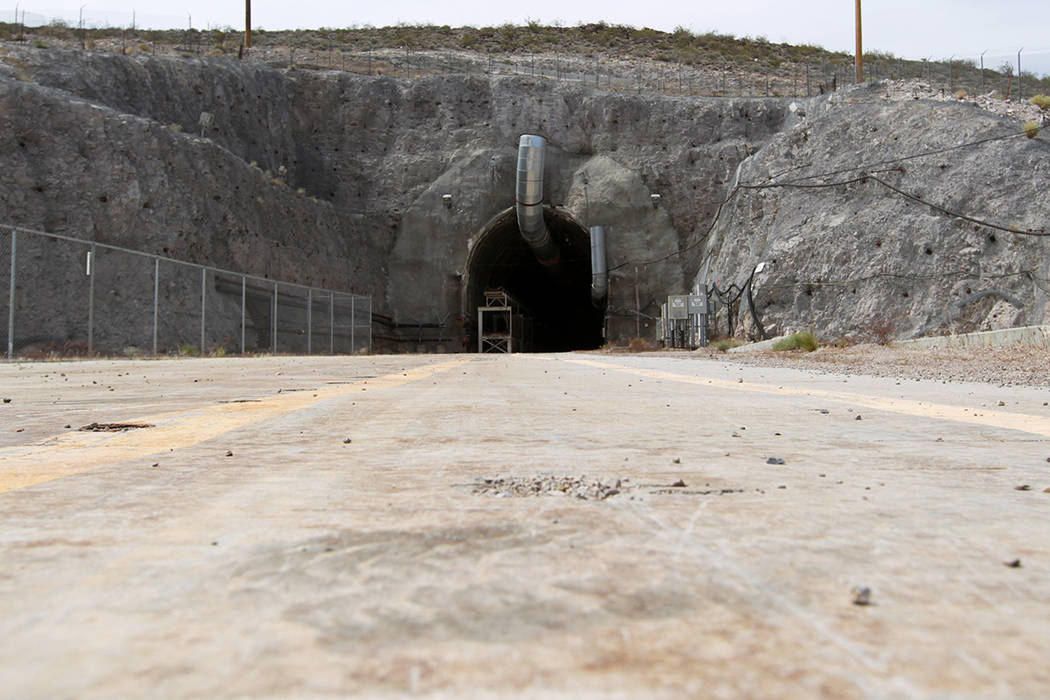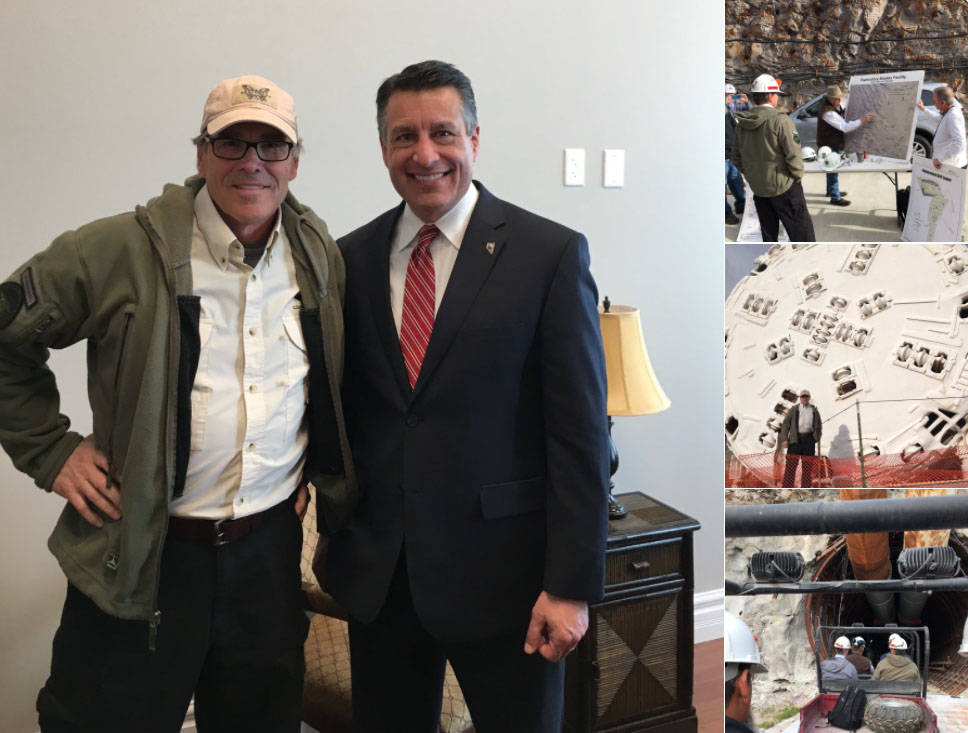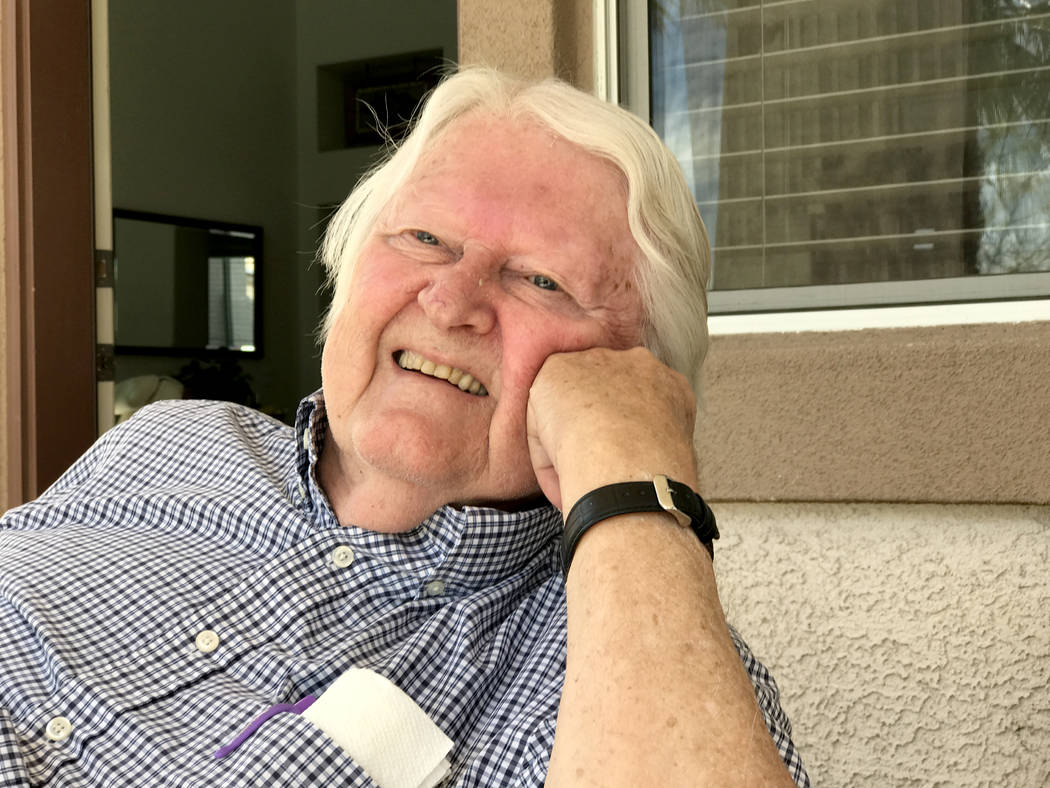Nevada has science edge if Yucca Mountain licensing resumes
If the Trump administration succeeds in resurrecting the dormant Yucca Mountain nuclear waste project, Nevada will have an important expertise edge over the feds.
That’s because the U.S. Department of Energy’s Yucca Mountain program was defunded and dismantled under President Barack Obama, leaving only a handful of scientists from the cadre of hundreds who once worked for the federal agency and its contractors.
“All the people doing that work retired, left the agency or are doing other work,” Nuclear Regulatory Commission spokeswoman Maureen Conley acknowledged Tuesday.
The department’s leadership ranks also are depleted. Unfilled positions currently include deputy energy secretary, undersecretary for energy and the environment, chairman of the Federal Energy Regulatory Commission and assistant secretary for nuclear energy.
The departed DOE scientists spent countless hours trying to devise a system to safely entomb thousands of tons of highly radioactive nuclear waste for millennia inside Yucca Mountain, a volcanic-rock ridge in Nye County, 100 miles northwest of Las Vegas. It is the only site federal scientists have studied in-depth for burying the estimated 77,000 tons of used nuclear fuel assemblies piling up at nuclear power plants around the nation.
With the state of Nevada preparing to add to an already long list of scientific challenges to the government’s case, experts say their absence will be deeply felt if the suspended NRC licensing hearings for the Yucca Mountain site resume, as President Donald Trump recommended in his proposed fiscal 2018 budget.
“The Trump administration will clearly have to get their technical ducks in a row if they are going to restart the license application process,” said Edwin Lyman, an internationally recognized nuclear power safety expert and senior scientist with the Union of Concerned Scientists, an organization founded in 1969 that advocates “truth in science … for a safer world.”
“They will have to marshal scientists to defend that application. My guess is they’re making decisions not based on the best available information, and they’ll have to play catch-up,” he said.
Finding funds
The Nuclear Energy Institute, which lobbies for the nuclear power industry and supports completion of the Yucca Mountain repository, said it supports the $120 million in funding included in Trump’s budget, and is confident that the DOE can quickly hire the scientific talent it needs to resume licensing hearings.
“We need to have an answer from the best scientists about the viability of that site,” NEI spokesman John Keeley said.
Republican leaders in Congress have not yet said if they will include the money in Trump’s budget blueprint to restart the Yucca Mountain licensing process in their spending plan.
Energy Department spokeswoman Lindsey Geisler said the Trump administration’s budget request to restart Yucca Mountain licensing activities and “initiate a robust interim-storage program” represented “the administration’s top-level proposed funding levels.”
Until the final fiscal year 2018 budget numbers are available in May, “no current licensing activities (are) taking place,” she said in an email to the Las Vegas Review-Journal.
Conley, the NRC spokeswoman, says the commission is awaiting “clear direction” from Congress on the project.
“We don’t have a whole lot left in the nuclear waste fund,” she said of the current balance of about $1.4 million, $611,424 of which is owed to contractors.
The Nevada Agency for Nuclear Projects says that the money in Trump’s budget would only get the process started. It estimates completion of the licensing process will cost $330 million just for the NRC if hearings before a construction authorization board take 650 days to resolve 250 contentions.
Prepared for a battle
If the licensing process does resume, Bob Halstead, the state’s chief Yucca Mountain critic as executive director of the state agency, says his legal and technical team is prepared to go toe-to-toe with the feds.
Among the scientific issues that Nevada officials are prepared to raise to derail Yucca Mountain are the dangers posed by transporting the deadly waste to the site, the risk of earthquakes or volcanic activity and the possibility that leaking waste could leach into the water table.
“None of the science-based safety and environmental controversies has yet been resolved,” Halstead said, adding that “all of the assumptions about safety and environmental concerns remain to be heard in a trial-like setting” before the NRC’s law judges.
Halstead said the state considers protection of groundwater the most problematic issue for proponents to overcome.
“The fundamental problem at Yucca Mountain is that the repository would be located above the water table in fractured rock. This creates a situation in which the geology itself cannot guarantee waste isolation for many thousands of years,” he said.
Additionally, he said, the Energy Department’s plan to install titanium “drip shields” to cover “waste packages” nearly a century after they’ve been put in the repository to prevent corrosion is too expensive, “and it may not work even if they install them exactly as they say they will.”
The NRC, which is meant to be the independent arbiter of scientific debate, has expressed confidence that only a small amount of groundwater contamination would occur during the first 200,000 years, well below standards set by the U.S. Environmental Protection Agency.
The political equation
While the scientific debate over the feasibility of Yucca Mountain is sure to be heated, one former federal scientist says the decision one whether to store the nation’s nuclear waste at the site ultimately will be a political one. And that doesn’t bode well for Nevada, he said.
Jim Daniel, a retired U.S. Geological Survey hydrologist and civil engineer from Las Vegas, notes that only 11 states other than Nevada have no spent fuel assemblies piling up at reactor sites or financial interest in nuclear power plants. As such, votes in Congress from pro-nuclear states for restarting the licensing process “far exceed those in lonely Nevada,” he said.
“It really comes down to a political decision,” said Daniel, who did not work on the Yucca Mountain Project but is familiar with many issues surrounding it as a Nevadan and through conversations with his former colleagues. “Now that (Senator) Harry Reid is gone, who’s going to stop it?”
Review-Journal staff writer Gary Martin contributed to this report. Contact Keith Rogers at krogers@reviewjournal.com or 702-383-0308. Find him on Twitter: @KeithRogers2
Shake and bake
Yucca Mountain was formed some 13 million years ago during alternating periods of volcanic ash falling from the sky and lava oozing from a caldera near Timber Mountain, 12 miles north, scientists say.
While federal geologists have argued volcanoes in the area are extinct, scientists for the state cite evidence in Crater Flat, west of Yucca Mountain, of two "super-episodes" of volcanic activity, including an eruption at Lathrop Wells 78,000 years ago that they believe represents the beginning of a third super-episode.
As for earthquakes, the most recent assessment by the U.S. Geological Survey, in 2008, shows Yucca Mountain is located in an area of moderate-to-high seismic hazard and is less than 10 miles from an active fault at Bare Mountain capable of producing a potential earthquake of magnitude 6.5.
Yucca Mountain also is less than 30 miles from two active faults in northern Death Valley and the Black Mountains with potential earthquake magnitudes of 6.5 -7.9 and 6.5-7.3, according to the USGS.
Sources: Nevada Agency for Nuclear Projects, U.S. Geological Survey



















